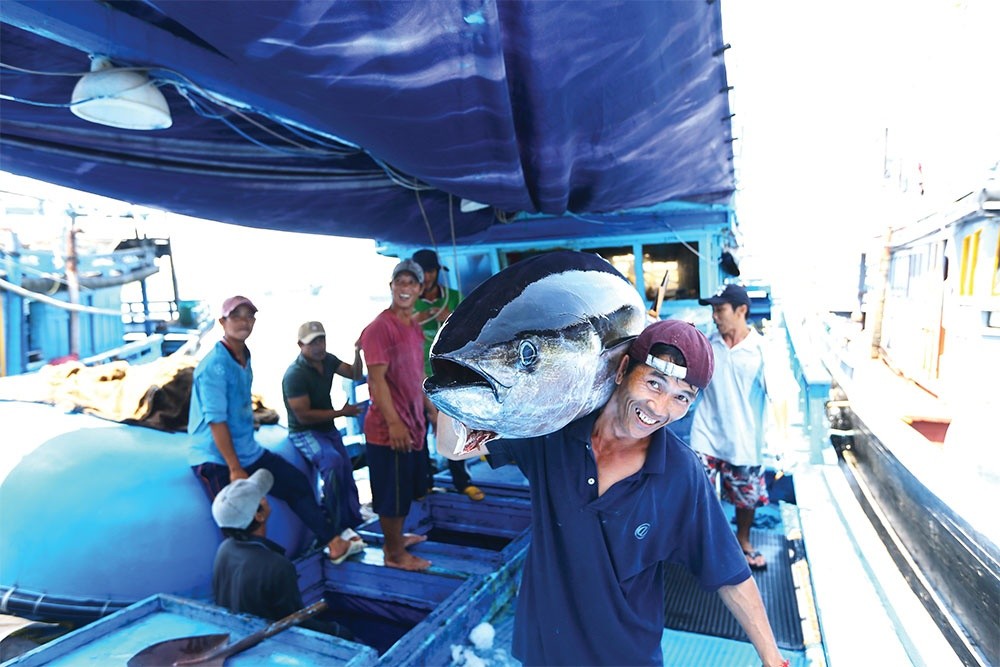
Localities urged to rectify flaws in fishery sector after European Commission's visit
Latest
A delegation of the European Commission (EC) will come to Vietnam on October 20-28 to examine remedies for the yellow card that was issued following alleged illegal, unreported, and unregulated (IUU) fishing.
Through Decision No.1077/QD-TTg on preventing and combating IUU by 2025, which was issued by the Prime Minister on September 14, Vietnam’s 28 coastal provinces and cities are undergoing major upgrades to overcome the EC’s yellow card, manage fishing activities, protect seafood resources and in the spirit of global integration.
Vietnam has been warned for not complying with the regulations since 2017, with all seafood exported to the EU being controlled thoroughly instead of just being occasionally checked.
The law concretised regulations on the management of fishery traceability to strictly control the supply chain. For instance, vessels must notify two hours in advance when the ship leaves or docks and must present complete papers and a declaration for functional checks. If all conditions are satisfied, they shall be stamped on the certification.
Vietnam has also updated and integrated regulations of export markets into the legal framework for transparent, effective, and responsible management. In particular, the traceability of aquatic products is considered one of the important contents for tracing products to manage the fisheries in a modern way in line with worldwide standards.
 |
| The European Commission will be looking for updates on the professionalism of Vietnam’s fishing sector. (Photo: VIR/Duc Thanh) |
Although the EC has made many recommendations for Vietnam to overcome the yellow card on IUU fishing, it mainly requires changes related to the management of fishing vessels at sea and docked ones for clear seafood traceability. These are also issues for which localities and businesses have recommendations to solve as soon as possible.
Specifically, the decision sets the goals to mark all fishing vessels and ensure the installation of cruise monitoring equipment for vessels with a length of 15m or more engaged in fishing activities; ensure that all such vessels’ documents and equipment are checked and in accordance with regulations; and inspect all aquatic products from domestic fishing when loading and unloading these through fishing ports.
Moreover, all aquatic products originating from foreign catches arriving at Vietnam’s seaports are inspected and supervised according to the Agreement on Port Country Measures of FAO-2009 and fishing vessels and fishers will be prevented from illegal fishing in foreign waters.
The solutions for the implementation of Decision 1077 include domestic tasks – which focus on communication programmes on the harmful effects of IUU fishing and seminars, professional training, and annual conferences directing the implementation of law enforcement and fishery management. They also include international tasks such as promoting communication programmes, preventing the distribution of negative and dishonest information, and cooperating with partners such as Australia, Norway, the US, and Europe to conduct training and information campaigns.
Moreover, the decision names several other tasks, such as solutions to completing the legal framework; investments and upgrades into the fishery infrastructure and organisational apparatus; and improvements to the capacity and efficiency of patrol, inspection, and control units at sea and other relevant forces; among others.
Le Hang, Director of Communications at the Vietnam Association of Seafood Exporters and Producers (VASEP), found that the EC’s yellow card had directly affected seafood exports to the EU and US markets, along with other potential markets.
Hang estimates that the aquaculture industry could lose over $90 million in the time to come due to indirect impacts of the current situation. In the medium term, if the current status lasts for 2-3 years, it may cause disruption to Vietnam’s seafood exports, in which fishing output would shrink by at least 30 per cent.
Vice versa, if Vietnam was to soon remedy issues related to the EC’s yellow card, “it could take advantage of the incentives in the EU-Vietnam Free Trade Agreement and rehabilitate the nation’s seafood industry,” Hang said. “The target of exporting $1.2-1.4 billion worth of seafood to the EU could then be feasible."
In the total export turnover of seafood products of Vietnam annually with $1.9-2.2 billion, the EU and the US each account for about 16-17 per cent with a value of about $350-400 million per year.





















